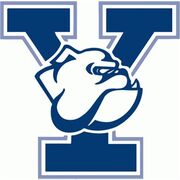The Yale Bulldogs football team represents Yale University located in New Haven, Connecticut. The Bulldogs are a member of the NCAA FCS Ivy League and play their home games at the Yale Bowl in West Haven, Connecticut. Their main rival is the Harvard Crimson . The Bulldogs are currently coached by Tony Reno .
Seasons [ ] 2020s [ ] 2010s [ ]
Season Coach Record
2019
Tony Reno
9-1
2018
Tony Reno
5-5
2017
Tony Reno
9-1
2016
Tony Reno
3-7
2015
Tony Reno
6-4
2014
Tony Reno
8-2
2013
Tony Reno
5-5
2012
Tony Reno
2-8
2011
Tom Williams
5-5
2010
Tom Williams
7-3
2000s [ ]
Season Coach Record
2009
Tom Williams
4-6
2008
Jack Siedlecki
6-4
2007
Jack Siedlecki
9-1
2006
Jack Siedlecki
8-2
2005
Jack Siedlecki
4-6
2004
Jack Siedlecki
5-5
2003
Jack Siedlecki
6-4
2002
Jack Siedlecki
6-4
2001
Jack Siedlecki
3-6
2000
Jack Siedlecki
7-3
1990s [ ] 1980s [ ] 1970s [ ] 1960s [ ] 1950s [ ]
Season Coach Record
1959
Jordan Olivar
6-3
1958
Jordan Olivar
2-7
1957
Jordan Olivar
6-2-1
1956
Jordan Olivar
8-1
1955
Jordan Olivar
7-2
1954
Jordan Olivar
5-3-1
1953
Jordan Olivar
5-2-2
1952
Jordan Olivar
7-2
1951
Herman Hickman
2-5-2
1950
Herman Hickman
6-3
1940s [ ]
Season Coach Record
1949
Herman Hickman
4-4
1948
Herman Hickman
4-5
1947
Howard Odell
6-3
1946
Howard Odell
7-1-1
1945
Howard Odell
6-3
1944
Howard Odell
7-0-1
1943
Howard Odell
4-5
1942
Howard Odell
5-3
1941
Spike Nelson
1-7
1940
Raymond Pond
1-7
1930s [ ]
Season Coach Record
1939
Raymond Pond
3-4-1
1938
Raymond Pond
2-6
1937
Raymond Pond
6-1-1
1936
Raymond Pond
7-1
1935
Raymond Pond
6-3
1934
Raymond Pond
5-3
1933
Reginald Root
4-4
1932
Marvin Stevens
2-2-3
1931
Marvin Stevens
5-1-2
1930
Marvin Stevens
5-2-2
1920s [ ]
Season Coach Record
1929
Marvin Stevens
5-2-1
1928
Marvin Stevens
4-4
1927
Tad Jones
7-1
1926
Tad Jones
4-4
1925
Tad Jones
5-2-1
1924
Tad Jones
6-0-2
1923
Tad Jones
8-0
1922
Tad Jones
6-3-1
1921
Tad Jones
8-1
1920
Tad Jones
5-3
1910s [ ]
Season Coach Record
1919
Albert Sharpe
5-3
1918
No team - World War I
1917
Tad Jones
3-0
1916
Tad Jones
8-1
1915
Frank Hinkey
4-5
1914
Frank Hinkey
7-2
1913
Howard Jones
5-2-3
1912
Art Howe
7-1-1
1911
John Field
7-2-1
1910
Ted Coy
6-2-2
1900s [ ]
Season Coach Record
1909
Howard Jones
10-0
1908
Lucius Biglow
7-1-1
1907
William Knox
9-0-1
1906
Foster Rockwell
9-0-1
1905
Jack Owsley
10-0
1904
Charles Rafferty
10-1
1903
George Chadwick
11-1
1902
Joseph Swan
11-0-1
1901
George Stillman
11-1-1
1900
Malcolm McBride
12-0
1890s [ ] 1880s [ ] 1870s [ ] Magazine covers [ ] External Links [ ] 
